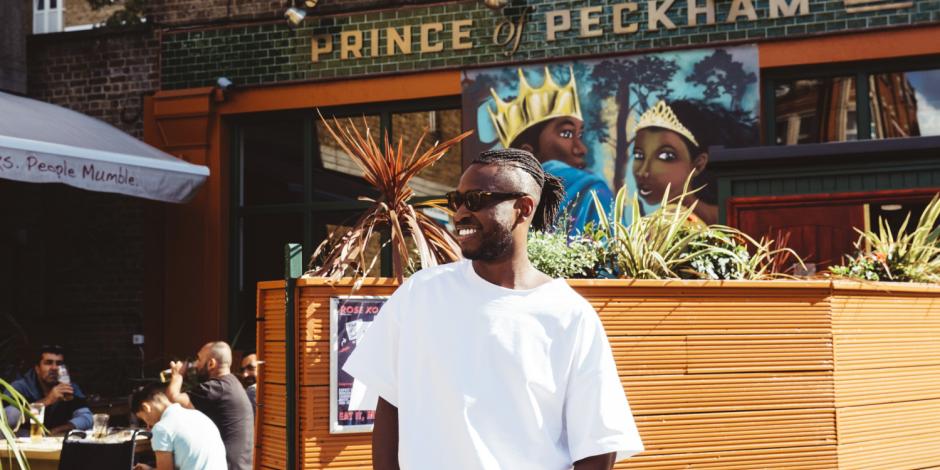The Prince of Peckham is a pub like no other. Situated in the heart of London’s most happening area, it operates on a simple principle. In the words of landlord Clement Ogbonnaya: “First and foremost, you serve your community.”
Located in Peckham, in south-east London, Ogbonnaya’s elegant yet homely (UK)gemütlichhomely pub is open every night of the week and is where something interesting is always taking place. Speed dating, baby drag bingo, neon naked life painting and Bolivian community meet-ups are just some of the events that are held under the glowingleuchtendglowing chandelierKronleuchterchandeliers.
There’s no building more important than a public house
It’s for everyone. “There’s no building more important than a public house,” says Ogbonnaya. “We can’t just focus on the hip (ifml.)cool, angesagthip. It’s important to celebrate what came before, too – for everyone to be part of the journey. It’s a place to laugh, cry, to mourntrauernmourn, get married and have baby showerBabypartybaby showers.”
In an era of identikit chain pubs, his approach is as refreshing as a long, cool draught of aleFassbierdraught of ale. “If you do something that really to embodyverkörpernembodies what’s around you, you won’t fail because the community won’t allow you to fail. You survive alone, you to thrivegedeihen, Erfolg haben↓thrive together.”
As pubs emerge from the shadow of multiple lockdowns, the Prince of Peckham is leading the way back to the light. Never have we been more aware of the importance of community. Ogbonnaya’s passion, though, for bringing people together goes all the way back to his early childhood.
At the age of six, he arrived in south-east London from Arochukwu, a village in Abia State, Nigeria. For a long time, he had a sense of not fitting in. “It wasn’t really cool to be African then,” he says. “South-east London was predominantlyüberwiegendpredominantly West Indian. Even if I was in a community of black people, I felt that because I was African, I wasn’t cool.”
Back in the 1980s, representations of people from the enormous African continent mainly focused on images of extreme suffering, as seen by Bob Geldof’s Live Aid campaign, aimed at to raise fundsGeld sammelnraising funds for famine-strickenvon Hungersnot geplagtfamine-stricken Ethiopia and Sudan. So, when young Ogbonnaya found a television show that to capturefesselncaptured his imagination, it stayed with him.
We’re not thinking of money. If we do things right, things will look after themselves
That show was Desmond’s, a sitcom about a West Indian barbershop in south-east London. A diversebunt gemischtdiverse cast of charactersRollenbesetzungcast of characters would to drop invorbeikommendrop in – not for Desmond’s poor barbering skillsFriseurkünstebarbering skills, but for the hilarious banter, which often sich um etw. drehenrevolved around being black in a predominantly white society.
The young Ogbonnaya was impressed. The show, created by a St Lucia-born writer, was based on real-life London barbershops serving as local hang-out (ifml.)Treffpunkt, Stammlokalhang-outs, and it challenged racial stereotypes. “They were the only black people on TV,” says Ogbonnaya. “Desmond’s was the only show that represented me and my family, people who had come to the UK to suchenseek better lives for them and their kids.
“I thought, Desmond’s barbershopFriseurladenbarbershop, that’s where it’s at,” he says.
The idea never left him. One character with whom he felt a special affinity was Lee Stanley, aka (also known as)aliasaka “The Peckham Prince”, the wide boy (UK, ifml.)Gaunerwide boy in the leather jacket, who switched between cockneyLondoner Dialektcockney and Jamaican patoisKreolsprachepatois. Decades later, when Ogbonnaya decided to open an establishment with the spirit of Desmond’s, he knew exactly what it should be called.
Today, visitors to Peckham’s real-life Desmond’s are greeted by a gigantic message above the pub: “Welcome to Peckham”. It’s like a manifesto, to proclaimverkündenproclaiming that this is a pub serving the people who live here. “We’re not thinking of money, we’re not thinking of the bottom lineunterm Strichbottom line. If we do things right, things will look after themselves,” says Ogbonnaya.
We just want to bring that village mentality over here
Five years on from the pub’s opening, he’s launching a group called The Village People, with a second pub in the pipelinein Planungin the pipeline. Any relation to the 1970s band? He to confessgestehenconfesses “Y.M.C.A.” is one of his favourite songs, but the inspiration comes from his village in Nigeria. Back in Arochukwu, neighbours would take care of each other’s children as if they were their own.
“We just want to bring that village mentality over here,” says Ogbonnaya. “If you have no passion, no belief, I don’t think you could work as relentlessunermüdlichrelentlessly as we do. We work knowing we love what we do. We care about people.”



